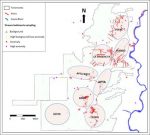
The potential for a nuclear reactor meltdown in Japan has caused a meltdown in the uranium mining sector.
Although the impact of the increasingly unpredictable situation has not yet translated into a decrease in the price of uranium (the price of uranium oxide, or U308, is set on a weekly basis by two independent companies, TradeTech and UxC), investors aren’t waiting around for that weekly update. Instead, they are aggressively selling off uranium stocks.
Uranium prices reached an all-time low of (US) $7/lb in 2001, but made an unprecedented move shortly thereafter. In April 2007 the price of Uranium on the spot market hit (US) $135.00/lb, a high point for U3O8. The massive move in the price of uranium was attributed to, in part, flooding of the Cameco (TSX:CCO) Cigar Lake Mine in Saskatchewan which is one of the largest undeveloped high-grade uranium ore deposits in the world. It has taken Cameco years to resolve the situation and the company is currently undertaking restoration work at the mine after is was finally dewatered in February, 2010. The Cigar Lake Mine flooding created uncertainty about the short term supply of uranium. This, coupled with rising oil prices and a general increase in demand for nuclear energy resulted in an astonishing move in the price of Uranium.
The price resurgence in uranium spurred expansion of current mines, construction of new mines, reopening of old mines and a wave of new prospecting. The price of uranium, however, has been volatile since peaking. Lately, the price of U3O8 has been flat out moving in the wrong direction for those long the element or companies that mine it.
On March 7th the U.S. authorized transfers of the nuclear fuel to fund accelerated cleanup operations at a former government owned enrichment plant and caused a US$3.75/lb drop to US$66.75. Then, on March 11th, Japan experienced the worst earthquake disaster in its modern history. The earthquake, which has since been upgraded to a 9.0 on the richter scale, was followed by a deadly tsunami that resulted in near complete destruction of the infrastructure in northern parts of Japan.
Initially, it seemed unlikely that such an event would dramatically impact the uranium sector. But Japan has a relatively high dependence on nuclear energy and, thus, many nuclear reactors. As the aftermath of the destruction hit the newswire, Japan declared a state of emergency in 5 reactors at two separate power plants The population is now bracing for what some say may top the Three Mile Island crisis of 1979, which was the worst nuclear event in US history.
Nuclear energy is of national strategic importance to Japan as the nation is heavily dependent on imported fuel. Japan, as an island nation with scarce energy resources, must rely on importing the vast majority of its primary energy requirements. In 2008, after the opening of seven new nuclear reactors, Japan became the third largest nuclear power user in the world with fifty-five nuclear power plants providing 34.5% of Japan’s electricity.
Anxiety over Japan’s quake-crippled nuclear reactors has re-sparked the “nuclear debate” in the U.S. as lawmakers are being pressured by activists for a review of U.S. energy policy as they demand that the government put the brakes on the expansion of domestic nuclear power. Opponents believe that nuclear power poses many threats to people and the environment and that the risks are not worth the benefits. Proponents of nuclear energy contend that nuclear power is a sustainable energy source that reduces carbon emissions and increases energy security by decreasing dependence on imported energy sources.
A perfect storm has, quite literally, hit the uranium market over the past week. The vast majority of uranium miners are now feeling the effects. Uranium One (TSX: UUU) is the top traded stock on the TSX today with over 33 million shares trading hands as of noon eastern time down a whopping $1.74 (-29%). Denison Mines (TSX: DML) isn’t fairing any better, shares are down $0.80 so far on the day currently trading at $2.39. The juniors are also taking it on the chin, shares of Hathor Exploration (TSXV: HAT) are down $0.74 (-26%) to $2.12.
To read the related article, “What will demand for Cameco’s uranium look like, post Japan?” CLICK HERE



 Follow us on Twitter
Follow us on Twitter Become our facebook fan
Become our facebook fan










Comments are closed.